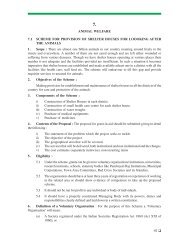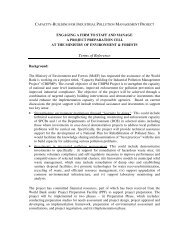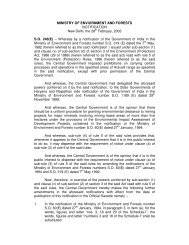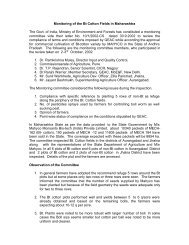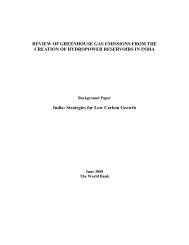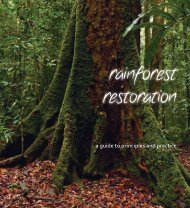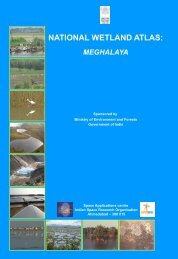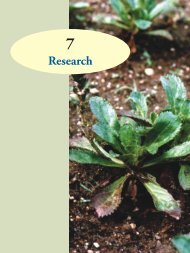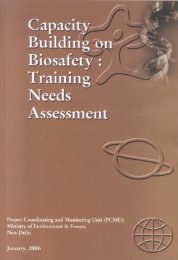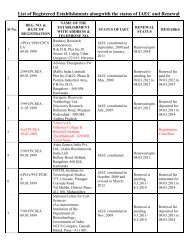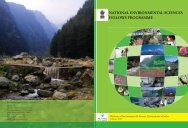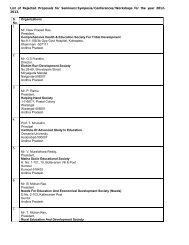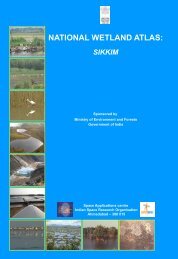Medicinal plants of North-Western Himalayas - Ministry of ...
Medicinal plants of North-Western Himalayas - Ministry of ...
Medicinal plants of North-Western Himalayas - Ministry of ...
Create successful ePaper yourself
Turn your PDF publications into a flip-book with our unique Google optimized e-Paper software.
<strong>Medicinal</strong> <strong>plants</strong> <strong>of</strong> <strong>North</strong>-<strong>Western</strong> <strong>Himalayas</strong>:<br />
Initiatives and Achievements <strong>of</strong> HFRI<br />
<strong>North</strong>-western Himalayan region with its wide range <strong>of</strong> altitudes, topography and climatic<br />
conditions, is a rich repository <strong>of</strong> medicinal wealth, which occupies an important place in Vedic<br />
treatise. More than 800 no. valuable medicinal species found in this part <strong>of</strong> India is extensively<br />
used by the locals since time immemorial for curing various diseases <strong>of</strong> humankind. It is now a<br />
well known fact that medicinal <strong>plants</strong> sector possesses great potential to uplift the economy <strong>of</strong> this<br />
part <strong>of</strong> India. However, various developmental and anthropogenic pressures on the forests,<br />
unscrupulous/unscientific exploitation <strong>of</strong> medicinal <strong>plants</strong> in the wake <strong>of</strong> their increasing national<br />
and a global trade, inadequacy <strong>of</strong> management inputs and lack <strong>of</strong> enabling legislation have caused<br />
severe depletion <strong>of</strong> the medicinal <strong>plants</strong> resource base thereby affecting the health and livelihood<br />
options <strong>of</strong> the people. The situation may further aggravate if some corrective measures are not put<br />
in place. Moreover, the trade in medicinal <strong>plants</strong> in the region is largely un-regulated, secretive<br />
and exploitative and takes place in the form <strong>of</strong> raw material. Even the post harvest handling <strong>of</strong> the<br />
raw material does not generally conform to the well laid down norms resulting in low<br />
remuneration to the poor rural people for their efforts to collect/cultivate medicinal <strong>plants</strong>, who<br />
have very small land holding and dependant on such activities for additional income.<br />
Encouraging commercial cultivation is vital for the success <strong>of</strong> medicinal <strong>plants</strong> sector to meet out<br />
the ever growing demand for temperate medicinal <strong>plants</strong> as this wealth has been depleting<br />
continuously since last two decades in their natural habitat. Biodiversity Conservation and<br />
Sustainable development <strong>of</strong> medicinal <strong>plants</strong> sector require active participation <strong>of</strong> local<br />
communities and people friendly policies. For obtaining common man’s support in medicinal<br />
<strong>plants</strong> sector, it must be linked with economic viability.<br />
Himalayan Forest Research Institute (HFRI), Shimla being one <strong>of</strong> the regional institute <strong>of</strong> Indian<br />
Council <strong>of</strong> Forestry Research and Education (ICFRE), Dehradun also started its focussed attention<br />
towards research and developmental activities in the <strong>Medicinal</strong> Plants Sector in <strong>North</strong>-<strong>Western</strong><br />
<strong>Himalayas</strong> since last decade. Accordingly, in its concerted efforts the institute was able to generate<br />
following knowledge in this direction:<br />
1. Survey in Some Important and Fragile Eco-Systems:<br />
With an intention to augment the earlier literature, the institute undertook survey in different<br />
ecologically sensitive and fragile zones in the state <strong>of</strong> Himachal<br />
Pradesh. Accordingly, a zist <strong>of</strong> information on the medicinal <strong>plants</strong><br />
as per their status has been prepared which is as below;<br />
1.1. Cold Deserts- The Ecologically Fragile Areas:<br />
The institute conducted survey in different areas <strong>of</strong> cold deserts in<br />
Pooh sub division <strong>of</strong> district Kinnaur, Himachal Pradesh revealed<br />
the presence <strong>of</strong> 114 medicinal plant species from the area. Out <strong>of</strong><br />
Saussurea gossypiphora<br />
1



